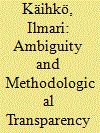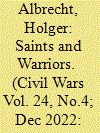| Srl | Item |
| 1 |
ID:
188713


|
|
|
|
|
| Summary/Abstract |
Researchers who study civil wars and other armed conflicts are bound to face ambiguities. This article continues the discussion about research brokers in conflict zones that started in a 2019 special issue of Civil Wars and scrutinises the finding that Liberian wartime command structures continue to linger in informal guises long to the post-conflict. Absent transparent acknowledging of the ambiguities it glosses over, past scholarship risks a far too neat story that imbues arguments with untested assumptions. The result neither captures the complexity of contemporary realities of Liberian former combatants nor helps Liberia to move forward from its difficult past.
|
|
|
|
|
|
|
|
|
|
|
|
|
|
|
|
| 2 |
ID:
188711


|
|
|
|
|
| Summary/Abstract |
While states and non-state armed groups often engage in militarised conflict over contested territory, at other times they co-govern in a tenuous equilibrium. Using a survey of over 1,600 Kurdish soldiers (Peshmerga) and elite interviews, we investigate local variation in shared governance in one such context – the disputed territories of northern Iraq. Despite the area being under Kurdish military control, the Iraqi government continued to provide services in districts where it had pre-existing infrastructural capacity. However, in revenue-producing districts, Kurdish actors appropriated infrastructural power to provide services themselves. This illustrates that non-state governance strategies, and their outputs, can vary locally.
|
|
|
|
|
|
|
|
|
|
|
|
|
|
|
|
| 3 |
ID:
188712


|
|
|
|
|
| Summary/Abstract |
Grievance and opportunity theories dominate research on the causes of civil war. However, theoretical and empirical problems limit their ability to explain variation in conflict onset. We argue that these problems partly stem from treating them as largely independent explanations. We integrate grievance and opportunity into a unified theory and argue that they are complements that jointly predict conflict. We apply insights from the interstate war literature to develop and test a theory of conflict onset that argues that the probability of civil war increases as the disparity between relative power and the status quo distribution of benefits increases.
|
|
|
|
|
|
|
|
|
|
|
|
|
|
|
|
| 4 |
ID:
188714


|
|
|
|
|
| Summary/Abstract |
In a recent article in Civil Wars, Ilmari Käihkö criticizes my research approach of collaborating with ex-commanders to study their own ex-command structures. While I welcome a discussion concerning the pros and cons of employing this approach, it must be based on a correct representation of the methods that I have used. Käihkö does not do this in his article, and he makes a number of false statements about my research. My ambition with this paper is to set the record straight and pave the way for a more productive discussion about how to best study ex-command structures.
|
|
|
|
|
|
|
|
|
|
|
|
|
|
|
|
| 5 |
ID:
188709


|
|
|
|
|
| Summary/Abstract |
This article explores how rebel groups come into being and how they sustain their activities. Its core premise is that the strategies used in rebel recruitment are crucial for such organisations. Knowing how rebel groups attract members will tell us why they are strong and, by extension, who is getting the upper hand in violent domestic conflicts. Drawing on empirical findings from the Syrian civil war, the article unpacks strategic choices in rebel recruitment: successful rebel groups benefit from the recruitment of combat-ready fighters (warriors) at the time of their inception and of high-commitment rebels (saints) amid sustained insurgent activities.
|
|
|
|
|
|
|
|
|
|
|
|
|
|
|
|
| 6 |
ID:
188710


|
|
|
|
|
| Summary/Abstract |
What explains the role of restraints on military for limiting victimisation of civilians? We find that a higher number of officers trained on counterinsurgency are associated with a lower number of civilians killed by government forces in civil wars. We also find that the number of civilians killed by government forces reduces as the degree of military involvement in politics reduces, and as the judiciary becomes independent. These results suggest that if the goal is to curb indiscriminate civilian killings, better training in counterinsurgency, the existence of judicial checks, and lowering military influence in politics are practical policy tools.
|
|
|
|
|
|
|
|
|
|
|
|
|
|
|
|